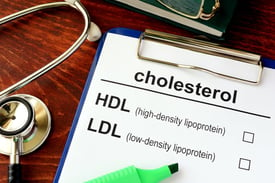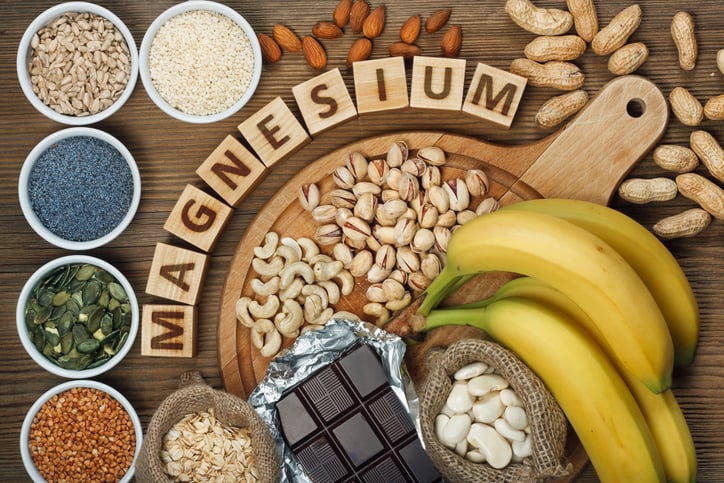Should you be Taking Magnesium for Heart Palpitations?
The feeling that your heart is pounding heavily, beating too fast, skipping beats or fluttering can have numerous causes. The occasional ones are...
3 min read
![]() Liberty HealthShare
Nov 2, 2022 9:00 AM
Liberty HealthShare
Nov 2, 2022 9:00 AM

If you’re experiencing an irregular heartbeat, doctors often recommend potassium for heart palpitations. Why? Potassium can help regulate your heartbeat if you’re getting the proper amount in your diet.
If your blood levels are low, increasing potassium intake will not only help to keep your heart in rhythm—the right amount encourages normal, healthy blood flow and reduces high blood pressure. But keep this in mind, excessive amounts can be dangerous.
So, if you’re experiencing heart palpitations and don't know how to slow them down, seek immediate medical attention. But if you get tested and find out you don’t have enough potassium in your blood, here is why doctors recommend taking potassium for heart palpitations.
Researchers at WebMD say that potassium doesn't prevent or treat heart diseases. However, in the right quantity, potassium can be beneficial to your heart in several ways, such as:
A diet rich in fruits, vegetables and low-fat dairy/fat-free foods can help lower high blood pressure. If you have high blood pressure, avoid taking potassium pills unless the doctor recommends or prescribes them.
On the one hand, there is no direct correlation between reduced cholesterol and potassium. On the other hand, diets and foods that lower cholesterol levels are known to have potassium, including fruits and vegetables. 
By reducing your bad cholesterol and increasing your good cholesterol intake, as well as eating foods rich in potassium, your heart will be much healthier and free from harmful cholesterol.
Potassium promotes a healthy and normal heartbeat and rhythm. Individuals with uneven heartbeat rhythms are often advised to eat potassium-rich foods. Sometimes, you may be advised to take potassium pills or supplements to increase your potassium levels. Irregular heartbeats, also known as arrhythmias, cause discomfort and can lead to other heart complications.
Potassium regulates your heart rate by controlling the myocardium's electrical signals. But it’s important that you get the right amount of potassium in your diet and not get too much.
Excess or high potassium intake can damage your heart and lead to an irregular heartbeat. Common symptoms include
Fatigue
Anxiety
Sweating
Dizziness or lightheadedness
Breath shortness
Chest pains
Slower than usual heartbeats
Fluttering sensation in your chest
"Racing" or "pounding" heartbeats.
But keep this in mind, you can get too much of a good thing. Getting too much potassium can cause a heart attack, weakness or muscle paralysis (in extreme cases).
 The recommended daily amount of potassium intake is 4,700 milligrams. But you should talk to your doctor about the amount of potassium that is right for you.
The recommended daily amount of potassium intake is 4,700 milligrams. But you should talk to your doctor about the amount of potassium that is right for you.
Potassium supplements are one way to get the proper amount into your diet. But the best sources of potassium are fruits, vegetables and nuts. It is worth noting that some of these sources have more potassium content than others. Knowing where to source potassium is equally important to avoid overdoing your intake.
Vegetables include:
Tomato
Zucchini
Spinach
Sweet potatoes
Potato
Potassium-rich legumes and nuts include:
Soybeans
Lentils
Kidney beans
Split beans
Almonds
Fruits rich in potassium include:
Bananas
Apricots
Oranges
Cantaloupes

Get a dietary recommendation from your doctor to help support your heart health. You can improve your heart health by eating more fruits and vegetables and reducing your fat and sodium intake.
Potassium also regulates cell, nerve and muscle function by maintaining a normal water balance between cells and body fluids. It is also important for synthesizing proteins and metabolizing carbohydrates.
Taking care of yourself, especially your heart is important. And getting the recommended daily allowance of potassium is a significant first step to developing a healthy diet.
In fact, taking such proactive measures will not only improve your health but will also help you reduce the costs associated with heart disease. By staying healthy, you’ll keep costs down by visiting the doctor less.
 You can also make Liberty HealthShare part of your plan. Liberty HealthShare is a Christian-based alternative to conventional health insurance. Our medical cost-sharing program promotes a healthy lifestyle, offers lower monthly payments than traditional insurance, and gives you the chance to be part of a like-minded community that you can enjoy. You can also keep your current doctor(s).
You can also make Liberty HealthShare part of your plan. Liberty HealthShare is a Christian-based alternative to conventional health insurance. Our medical cost-sharing program promotes a healthy lifestyle, offers lower monthly payments than traditional insurance, and gives you the chance to be part of a like-minded community that you can enjoy. You can also keep your current doctor(s).
Our Christian healthshare ministry helps members get freedom from traditional health insurance and enjoy a better quality of life within a like-minded community. Contact us to learn more about our holistic healthshare program.

The feeling that your heart is pounding heavily, beating too fast, skipping beats or fluttering can have numerous causes. The occasional ones are...

Sugar is a very common ingredient found in many of the foods we eat, from fresh-baked chocolate chip cookies to the ketchup you dip your French fries...

Visiting a doctor is an important step in maintaining our physical well-being, and for many of us, it's a time when we seek answers, guidance, and...